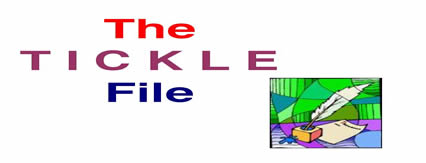
|
The Tickle File is ftm's daily column of media news, complimenting the feature articles on major media issues. Tickle File items point out media happenings, from the oh-so serious to the not-so serious, that should not escape notice...in a shorter, more informal format.
We are able to offer this new service thanks to the great response to our Media Sleuth project in which you, our readers, are contributing media information happening in your countries that have escaped the notice of the international media, or you are providing us information on covered events that others simply didn't know about. We invite more of you to become Media Sleuths. For more information click here. |
Hot topics click link for more
Czech public broadcasters pushed back at the suggestion by a right-wing politician that their services be nationalized. After gaining seats in parliament in recent Czech elections, which the center-right ANO party of billionaire Andrej Babis upended established political parties for a thin plurality, the far-right Freedom and Direct Democracy (SPD) party led by Tomio Okamura appears likely to be the governing coalition partner. Other Czech political parties, coming up rather short on election day, have refused to enter a government with ANO.
“We want to change them,” said Mr. Okamura of public broadcasters Czech Television and Czech Radio, quoted by Tyden (October 23), “which means we want to abolish (license) fees, nationalize them and make the National Audit Office clean their business.” He is still seething about a less than flattering cartoon published by Czech TV during the campaign. “When we are in government, we will focus on Czech TV and Czech Radio,” he added, not unlike promises made by far-right politicians in Hungary and Poland after election victories.
“Czech Radio has been, is and will always be completely transparent," said director René Zavoral. "The nationalization of Czech Radio and Czech Television would mean suppressing freedom of speech (and) distorting objective and truthful public information. It would be a step back to a totalitarian system.” (See more about media in the Czech Republic here)
Czech TV and Czech Radio are independent and serve no political point of view, said Czech TV director Petr Dvořák. “Perhaps that is why we are often the target of similar attacks against which we must constantly define ourselves. The high trust that the public service media enjoys from viewers and listeners can never be realized by a state media.”
Asked about all this, Mr. Babis steered clear, very clear. "I do not want to express myself at all,” he said, quoted by news portal iDNES.cz (October 24), which he owns. “Of course, nobody wants to nationalize anything. We have a clear system and we do not want to change anything.”
Every election, it seems, puts public broadcasters on guard. A crush of new populist nationalism mixed with neo-liberal fervor has again targeted funding, programming, organization and, indeed, political acquiescence. Throw in, too, digital quandary and the instincts of traditional publishers.
In the wake of recent parliamentary elections in Germany the 16 Federal States returned to debating the public broadcasting treaty, which is set for revision early next year. The major discussion point at the Broadcasting Commission meeting (October 20) was the degree to which public broadcasters, regional and national, use new media platforms. It’s an issue near and dear to the hearts (and bank accounts) of traditional publishers but also beholders of messaging. The State Ministers agreed to adjustments complying with recent data protection laws. (See more about media in Germany here)
Also raised - but mostly dismissed - was the possibility of merging the ARD public regional network with ZDF, the public national channel, effectively rendering the Das Erste programs that appear in prime-time on the ARD network redundant. That would end the legacy national TV news program Tagesschau, allowing each regional public broadcaster more control over the evening news. A pop-up poll from Die Welt (October 21) showed greatest support of this idea among people in eastern States as well as those across a broad political spectrum, from the far-right AfD and center-right FDP to center-left SPD.
|


